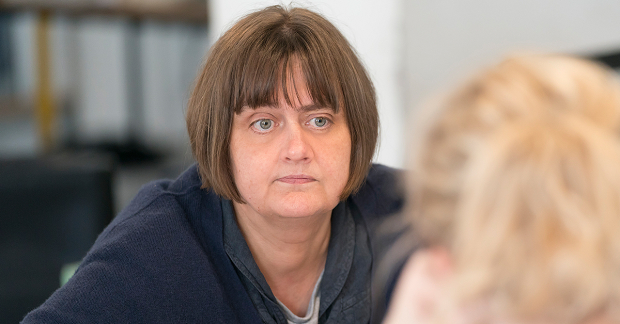Sarah Frankcom on her time at the Royal Exchange: "We always say Manchester does things differently – it really does"
The outgoing artistic director has transformed the Royal Exchange into a powerhouse during her tenure

© Johan Persson
In her time as artistic director of the Royal Exchange, Sarah Frankcom has transformed the venue into one of the UK's most vibrant and relevant theatres. Having been at the company for over two decades, Frankcom is set to leave her role in November and begin a new challenge as director of LAMDA. Her final production Light Falls, with music by Jarvis Cocker, will play from 24 October to 16 November. The play is a new work by Simon Stephens, of whom Frankcom says: "Simon has been a huge collaborator and a great friend – he was the first playwright that I commissioned and we have made a lot of work together, so it is apt I am finishing my Exchange career with one of his plays." We caught up with her in Light Falls rehearsals to ask about the challenges and triumphs of her time working in Manchester.
You have been artistic director at the Royal Exchange for over ten years – what were your initial intentions with the role?
I felt the artistic programme needed to change – it can take a long time for theatre artists to be entrusted with main stages and I was aware of how blocking that can be. It was important that we opened up an incredibly iconic space to a wider variety of younger artistic imaginations.
I was also very keen that we had a more direct and equitable relationship with our audiences. You, The Audience was really about me trying to understand peoples' relationships with the building and how to open it up to people that weren't coming.
Finally it was also about looking at what the repertoire needed to be. In the first part of time when I was at the Exchange, the kind of plays that it was producing didn't change very much – it felt like there was a particular and rigid white, male lens through which the theatre was programmed and I struggled as a director to find work within the canon that I felt interested in making. I suppose becoming the artistic director meant that I could make the kind of work that I wanted to see.
How has the role of the artistic directorship has changed in the time that you have held the position?
My generation are the last that have had the benefits of a healthy subsidised sector; student grants, housing benefits, unemployment benefits, all of those things that made a massive difference when we were starting out and allowed us to keep within the theatre industry until we started to be able to earn a living from it. I think it's so much harder now for directors starting out to support and sustain themselves.
Nowadays, you need to be able to do many more things as an artistic director – it is not just about making plays. In a really visionary appointment, the board at the Exchange have realised that if they want freshness and relevance then it is actually much healthier to have a partnership between two much younger artistic directors [Bryony Shanahan and Roy Alexander Weise, who take up the roles in November 2019] who will be coming to the roles barely 30 years of age.
Are you looking forward to where Bryony and Roy will take the theatre in the future?
Hugely, I cannot think of better people to making work in that space and in Manchester. I just think they'll blow the doors off – they've got masses of energy and ideas.
Is there a production you are particularly proud of? Some of the work you have created with Maxine Peake (Hamlet, A Streetcar Named Desire, Happy Days) must be memorable?
The Masque of Anarchy at MIF definitely stands out. But for me, the things that I will remember out of the shows that Max and I have made are more about moments. Moments in rehearsals, moments when she's in performance where I have stopped breathing because she has done something that feels like it is happening for the first time but I absolutely know that we rehearsed it. It is an incredibly exciting feeling.
What do you think you'll miss about the Royal Exchange or Manchester in general?
I could never have run another theatre – it doesn't get any better than leading that company. There is a whole raft of amazingly talented people in that building who have supported me, got behind my vision and helped me realise it. You can have ideas and think you know what you want to do but unless you're working with passionate people who care and can make that happen, the ideas are nothing.
I will miss Manchester because it is full of energy, it is a really creative city. There is great leadership in our cultural organisations and the city is really interested in what its conversation with itself is about. I don't know anywhere else that values its citizens in the same way.
We always say Manchester does things differently but it really does. I will really miss the excitement of what is possible in that city.





















